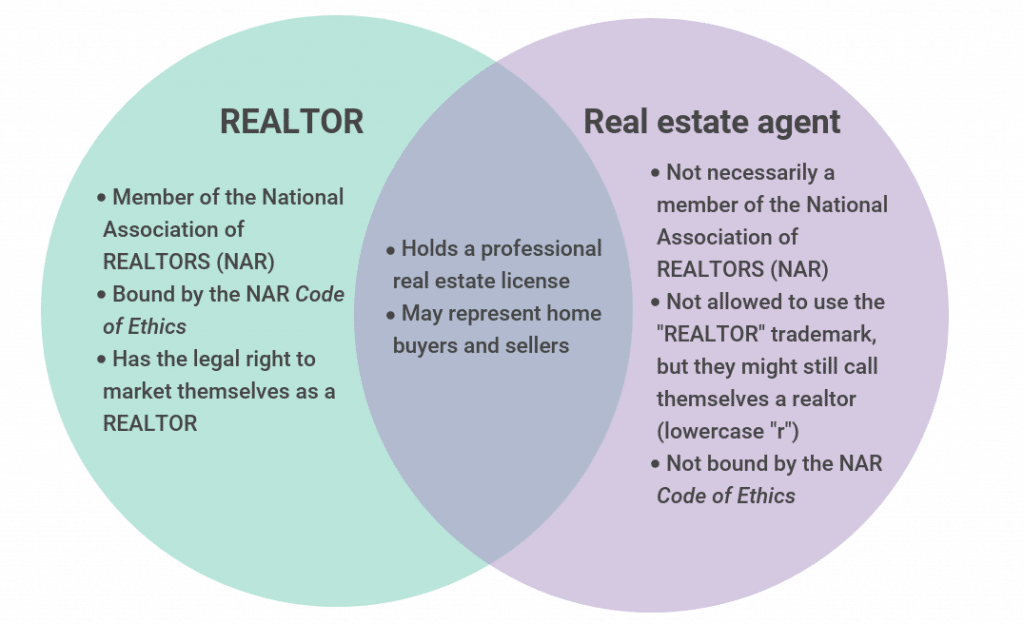
Published
What is a realtor? | Code of ethics | What is an agent? | How to decide | FAQs
The terms “real estate agent” and “realtor” are often used interchangeably to describe a licensed professional who can help you buy or sell a home. But the terms have different meanings.
- A realtor is a licensed salesperson who belongs to the National Association of Realtors (NAR), and must comply with NAR’s code of ethics. The term is capitalized when describing a NAR member, and NAR owns the trademark.
- A real estate agent is simply a licensed salesperson who does not belong to NAR, and refers to any individual who holds a real estate salesperson’s license.
Should you hire a real estate agent or a realtor? Agents who belong to NAR aren’t necessarily better than non-member agents. NAR is just a trade association – not a licensing body – so membership is completely optional.
Here’s a guide breaking down the key differences between realtors and real estate agents, including how agents become realtors, how to join NAR and the costs, and how to decide which type of agent to work with.
Need a great agent? Check out our how to find a realtor guide for specific advice.
🔑 Key takeaways:
- Real estate agents are often called realtors, but technically only a member of the National Real Estate Association (NAR) can be called a REALTOR.
- Realtors need to follow NAR’s strict code of ethics.
- Agents who have a NAR membership aren’t necessarily better at their job than agents who don’t.
Realtor vs. real estate agent: Key differences

There’s significant overlap between realtors and real estate agents because many licensed agents are members of the NAR.
Agents who join the NAR have access to training resources, member discounts, and professional certifications.
The NAR also has a detailed Code of Ethics that all REALTORS must follow.
What is a realtor?

A realtor is simply a licensed real estate agent or real estate broker who decides to join NAR and a maintain a membership. NAR is the largest trade association in the U.S.
There’s significant overlap between realtors and real estate agents because many licensed agents are NAR members. But realtors ultimately perform the same tasks as non-NAR members, including:
- Listing homes for sale on the Multiple Listing Service (MLS).
- Marketing properties on social media and popular real estate sites.
- Showing houses to buyers.
- Preparing paperwork and negotiating contracts.
- Setting up home inspections, appraisals, and walk-throughs.
- Communicating with all parties involved in the real estate transaction prior to closing.
Realtors don’t usually charge more for their services compared to a real estate agent. Most realtors and agents charge sellers a commission rate between 5% to 6% of the home’s sale price, covering both the listing agent and buyer’s agent commission.
The NAR Code of Ethics
Unlike real estate agents, realtors must abide by NAR’s Code of Ethics, which contains 17 articles that guide the way realtors conduct business.
The articles in the Code of Ethics is intended to protect clients, the public, and other real estate professionals. It explains a member’s duties to these parties.
Violation of the Code of Ethics could result in disciplinary action, including dismissal from the NAR.
Anyone can search NAR’s database to find information about active realtors, including the realtor’s area of specialization and associations they belong to.
The results include what area(s) the REALTOR specializes in and the local/state REALTOR associations they belong to. You can also search by city, state, and designation to identify qualified REALTORS in your area.
How do agents become realtors?
Licensed real estate agents can become realtors if the designated broker at their firm is already a realtor.
To join, the agent needs to complete NAR training on the Code of Ethics, pay a one-time application fee ($395) and annual membership dues ($95), and complete additional ethics training once every three years.
Membership is not restricted to just real estate agents and brokers. Appraisers, property managers, and other real estate professionals are also able to join.
Are all real estate agents realtors?
Not all real estate agents are realtors because not every agent is a NAR member.
Currently, about half of all real estate agents are NAR members, with over 1.5 million members compared to the 3 million or so licensed real estate agents nationwide.
People often refer to all real estate agents as realtors. It’s generally acceptable when written in lowercase as a generic term. The term “REALTOR®” is NAR’s trademarked version.
What is a real estate agent?
A real estate agent refers to any licensed salesperson who helps the public buy and sell properties, but has not joined NAR.
Buyer’s agent: A buyer’s agent represents you when you need to find and purchase a home. A good buyer’s agent can help you find houses that meet your budget and purchase criteria, advise you on offers, and close the deal.
Listing agent: A listing or seller’s agent helps you sell your home as fast as possible for the highest price. A good listing agent markets your home to buyers, negotiates price and contract terms, and coordinates closing.
Real estate agents work for real estate brokerages as independent contractors. You technically hire a real estate brokerage to work for you, while the agent represents the brokerage.
How to become a real estate agent

The process of obtaining a real estate sales license usually takes several months, if not longer.
First, the prospective agent needs to understand their state’s licensing requirements. Most states require completion of a pre-licensing course, which can take a few months.
After completing a pre-licensing course and exam, prospective agents must choose a broker to be sponsored by, and pass a state real estate exam.
The real estate exam covers national real estate law, as well as laws covering the agent’s particular state.
Agents must become a member of the MLS and complete real estate post-licensing coursework within 6-12 months of obtaining their real estate license.
Finally, real estate agents must pay annual licensing fees ($200 – $300) and MLS dues ($750 – $1,000) to maintain an active license.
How do real estate agents make money?

Realtors and real estate agents both get paid through commission upon the closing of the home sale.
Commission typically ranges from between 5% to 6% of the sale price, which is typically split evenly between the buyer’s agent and listing agent.
The agent doesn’t usually get to take home 100% of that commission – it’s often shared with their brokerage.
» MORE: Realtor Fees: Who Pays the Commission and How Much is It?
What is a real estate broker?
A real estate broker, managing broker, or broker associate is a licensed real estate professional that can help people buy and sell properties, just like an agent.
However, real estate brokers holds a more advanced licensed compared to a realtor or real estate agent, as they’ve qualified for and passed a broker licensing exam.
Brokers are usually able to hire real estate agents to work for them, and take a share of the commission for every sale. The broker supervises all real estate transactions.
Realtor vs. real estate agent: How to decide
Should you hire a real estate agent or a realtor?
A realtor may be a smart choice if you want a more experienced, trained agent. Realtors have completed additional training and are required to abide by NAR’s code of ethics.
However, agents who belong to NAR aren’t automatically better than non-member agents. NAR is just a trade association – not a licensing body – so membership is completely optional.
Need an agent? What to do next
We recommend finding and comparing multiple agents to choose the best fit for you.
If you’ve found agents but need help deciding between options, read our guide on how to choose a realtor.
Realtor vs. real estate agent FAQs
Are all real estate agents realtors?
No. About half of all active real estate agents (1.5 million) are actually realtors. This means a real estate agent becomes a member of the National Association of Realtors (a trade association for people who work in the real estate industry).
However, the terms "realtor" and "real estate agent" are often used interchangeably to describe a real estate buyer's or seller's agent, causing confusion.
Real estate agents and realtors ultimately perform the same tasks for home buyers and sellers. You still need to carefully vet each option, even if you decide to work with a realtor. Learn how to find and vet quality agents for more information.
What are a realtor's responsibilities?
A realtor is required to abide by NAR's strict code of ethics that is intended to protect clients, the public, and other real estate professionals. That includes treating all clients fairly and honestly, and putting a client's best interests before their own.
Should realtor be capitalized?
Realtor should be capitalized when referring to a licensed real estate agent or real estate broker who is a member of NAR. The term "REALTOR®" is a trademark owned by NAR, and protected by federal law.
However, real estate agent and realtor (no caps) are often used interchangeably to describe a real estate salesperson.
Related links
How to Find a Real Estate Agent: What You NEED to Know. Learn how to find top local real estate agents and save money at the same time.
The Role of the Real Estate Agent. Whether you’re buying or selling a home, working with a real estate agent will help you save time and money. Find out more about what agents do!
How to Sell Your Home – The Complete Guide. Our 12-step guide breaks down how to sell your home, with or without a realtor.
What Companies Offer the Lowest Real Estate Commission Fees? Discount real estate companies promise to save you money while still offering professional service. Check out our list of the best options

Leave a Reply